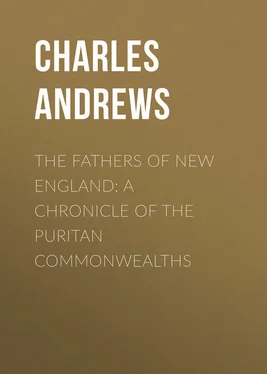Charles Andrews - The Fathers of New England - A Chronicle of the Puritan Commonwealths
Здесь есть возможность читать онлайн «Charles Andrews - The Fathers of New England - A Chronicle of the Puritan Commonwealths» — ознакомительный отрывок электронной книги совершенно бесплатно, а после прочтения отрывка купить полную версию. В некоторых случаях можно слушать аудио, скачать через торрент в формате fb2 и присутствует краткое содержание. Жанр: foreign_antique, foreign_prose, Историческая проза, на английском языке. Описание произведения, (предисловие) а так же отзывы посетителей доступны на портале библиотеки ЛибКат.
- Название:The Fathers of New England: A Chronicle of the Puritan Commonwealths
- Автор:
- Жанр:
- Год:неизвестен
- ISBN:нет данных
- Рейтинг книги:3 / 5. Голосов: 1
-
Избранное:Добавить в избранное
- Отзывы:
-
Ваша оценка:
- 60
- 1
- 2
- 3
- 4
- 5
The Fathers of New England: A Chronicle of the Puritan Commonwealths: краткое содержание, описание и аннотация
Предлагаем к чтению аннотацию, описание, краткое содержание или предисловие (зависит от того, что написал сам автор книги «The Fathers of New England: A Chronicle of the Puritan Commonwealths»). Если вы не нашли необходимую информацию о книге — напишите в комментариях, мы постараемся отыскать её.
The Fathers of New England: A Chronicle of the Puritan Commonwealths — читать онлайн ознакомительный отрывок
Ниже представлен текст книги, разбитый по страницам. Система сохранения места последней прочитанной страницы, позволяет с удобством читать онлайн бесплатно книгу «The Fathers of New England: A Chronicle of the Puritan Commonwealths», без необходимости каждый раз заново искать на чём Вы остановились. Поставьте закладку, и сможете в любой момент перейти на страницу, на которой закончили чтение.
Интервал:
Закладка:
Migration ceased in 1641, and a time of stress and suffering set in. Commodities grew scarce, prices rose, many colonists returned to England leaving debts behind, and as yet the colony produced no staples to exchange for merchandise from the mother country. Some of the settlers, discouraged, went to the West Indies; others, fleeing for fear of want, found their way to the Dutch at Long Island. Pressure was brought to bear at various times to persuade the people to migrate elsewhere as a body, to Old Providence and Trinidad in the Caribbean, to Maryland, and later to Jamaica; but these attempts proved vain. The Puritan was willing to endure hardship and suffering for the sake of civil and religious independence, but he was not willing to lose his identity among those who did not share his faith in the guiding hand of God or who denied the principles according to which he wished to govern his community. At first the leaders of the migration were Nonconformists not Separatists. Francis Higginson, Endecott's minister at Salem, had declared in 1629 that they did not go to New England as separatists from the Church of England but only as those who would "separate from the corruption in it"; and Winthrop used "Easter" and the customary names of the months until 1635. But the Puritans became essentially Separatists from the day when Dr. Samuel Fuller of Plymouth persuaded the Salem community, even before the company itself had left England, to accept the practices of the Plymouth Church. Each town consequently had its church, pastor, teacher, and covenant, and became an independent Congregational community – a circumstance which left a deep impress upon the life and history of New England.
The government of the colony was never a democracy in the modern sense of the term. At first in 1630, control was assumed by the governor and his assistants, leaving but little power in the hands of the freeman; but such usurpation of power could not last, and in 1634 the freemen were given the right to elect officials, to make and enforce laws, raise money, impose taxes, and dispose of lands. Thus was begun the transformation of the court of the company into a parliament, and the company itself into a commonwealth. So self-sufficient did the colony become in these early years of its history that by 1646 Massachusetts could assert that it owed only allegiance to England and was entirely independent of the British Parliament in all matters of government, in which affairs under its charter it had absolute power. Many denied this contention of the leaders, asserting that the company was only a corporation and that any colonist had a right of appeal to England. Winthrop refused definitely to recognize this right, and measures were taken to purge the colony of these refractory spirits, among whom were Dr. Robert Child, one of the best educated men of the colony, William Vassall, and Samuel Maverick. All were fined, some clapped in irons, and many banished. Child returned to England, Vassall went to Barbados, and the rest were silenced. So menacing was the revolt that Edward Winslow was sent to England to present the case to the parliamentary commissioners, which he did successfully.
But among those who upheld the freedom of the colony from English interference and control there were many who complained of the form the government was taking. The franchise was limited to church members, which debarred five-sixths of the population from voting and holding office; the magistrates insisted on exercising a negative vote upon the proceedings of the deputies, because they deemed it necessary to prevent the colony from degenerating into "a mere democracy"; and the ministers or elders exercised an influence in purely civil matters that rendered them arbiters in all disputes between the magistrates and the deputies. Until 1634, the general court had been a primary assembly, but in that year representation was introduced and the towns sent deputies, who soon began to complain of the meagerness of their powers. From this time on, the efforts of the deputies to reduce the authority of the magistrates and to increase their own were continuous and insistent. One bold dissenter was barred from public office in 1635 for daring to deny the magistrates' claim, and others expressed their fear that autocratic rule and a governor for life would endanger the liberty of the people. The dominance of the clergy tended to the maintenance of an intolerant theocracy and was offensive to many in Massachusetts who, having fled from Laud's intolerance at home, had no desire to submit to an equal intolerance in New England. Between 1634 and 1638 the manifestations of this dislike became conspicuous and alarming. The Governor's son, the younger John Winthrop, dissatisfied with the hard régime in Massachusetts, returned to England in 1634. Henry Vane, though elected Governor in 1636, showed marked discontent, and when defeated the next year left the colony. The English aristocratic Puritans, Saye and Sele, Brooke, and others, who planned to leave England in 1635, found themselves so out of accord with the Massachusetts policy of limiting of the suffrage to church members – and to church membership as determined by the clergy – that they refused to go to Boston, and persisted in their plan for a settlement at Saybrook. The Massachusetts system had thus become not a constitutional government fashioned after the best liberal thought in England of that day, but a narrow oligarchy in which the political order was determined according to a rigid interpretation of theology. This excessive theocratic concentration of power resulted in driving from the colony many of its best men.
More notorious even than the political dissensions were the moral and theological disputes which almost disrupted the colony. The magistrates and elders did not compel men to leave the colony because of political heresy, but they did drive them out because of difference in matters of theology. Even before the company came over, Endecott had sent John and Samuel Browne back to England because they worshiped according to the Book of Common Prayer. Morton and six others were banished in 1630 as an immoral influence. Sir Christopher Gardiner, Philip Ratcliffe, Richard Wright, the Walfords, and Henry Lynn were all forced to leave in 1630 and 1631 as "unmeete to inhabit here." Roger Williams, the tolerationist and upholder of soul-liberty, who complained of the magistrates for oppression and of the elders for injustice and who opposed the close union of church and state, was compelled to leave during the winter of 1635 and 1636. But the great expulsion came in 1637, when an epidemic of heresy struck the colony. A synod at Newtown condemned eighty erroneous opinions, and the general court then disarmed or banished all who persisted in error.
A furor of excitement gathered about Anne Hutchinson, who claimed to be moved by the spirit and denied that an outward conformity to the letter of the covenant was a sufficient test of true religion unless accompanied with a change in the inner life. She was a nonconformist among those who, refusing to conform to the Church of England, had now themselves become conformists of the strictest type. To Mrs. Hutchinson the "vexatious legalism of Puritanism" was as abhorrent as had been the practices of the Roman and Anglican churches to the Puritans, and, though the latter did not realize it, they were as unjust to her as Laud had been to them. She broke from a covenant of works in favor of a covenant of grace and in so doing defied the standing authorities and the ruling clergy of the colony. Her wit, undeniable power of exhortation, philanthropic disposition, and personal attributes which gave her an ascendency in the Boston church, drew to her a large following and placed the supremacy of the orthodox party in peril. After a long and wordy struggle to check the "misgovernment of a woman's tongue" and to rebuke "the impudent boldness of a proud dame," Mrs. Hutchinson was excommunicated and banished; and certain of those who upheld her – Wheelwright, Coggeshall, Aspinwall, Coddington, and Underhill, all leading men of the colony – were also forced to leave. In Boston and the adjoining towns dozens of men were disarmed for fear of a general uprising against the orthodox government.
Читать дальшеИнтервал:
Закладка:
Похожие книги на «The Fathers of New England: A Chronicle of the Puritan Commonwealths»
Представляем Вашему вниманию похожие книги на «The Fathers of New England: A Chronicle of the Puritan Commonwealths» списком для выбора. Мы отобрали схожую по названию и смыслу литературу в надежде предоставить читателям больше вариантов отыскать новые, интересные, ещё непрочитанные произведения.
Обсуждение, отзывы о книге «The Fathers of New England: A Chronicle of the Puritan Commonwealths» и просто собственные мнения читателей. Оставьте ваши комментарии, напишите, что Вы думаете о произведении, его смысле или главных героях. Укажите что конкретно понравилось, а что нет, и почему Вы так считаете.












